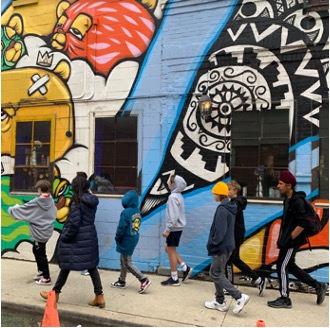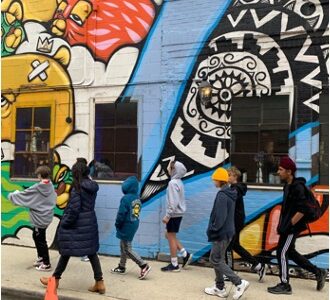Click here to listen to this week’s JAM – Reaching Beyond, High School Style.
This week our 7th and 8th graders and their parents have been invited to learn about our Reach Beyond Week offerings for next Spring, which include trips to the Teton Science Center in Wyoming, Peru, Japan & Taiwan, and Washington DC. Reach Beyond Week, a program we started six years ago, provides students extended real-world learning opportunities that focus on making a difference for people and the planet. Guided in significant part by the work of Hillbrook’s Scott Center for Social Entrepreneurship and tied to our school’s vision – to inspire students to achieve their dreams and reach beyond themselves to make a difference in the world, Reach Beyond Week is a core part of the Middle School experience. Students are buzzing about their choices.
Looking at these offerings, I become ever more excited about what we are designing for the high school – what we are calling Reach Beyond Immersives. Immersives are three-week, transcripted courses that all students will take at the end of each semester. Building on our Middle School programming, immersives will prioritize real-world learning, taking students outside of the classroom to engage in place-based learning that is complex and interdisciplinary and calls on students to develop as systems thinkers and problem solvers. Our founding class will have opportunities at the end of the first semester to immerse themselves in San Jose, building on the concept of city as classroom. Proposed offerings include “victory salute,” which takes a look at the history of the iconic 1968 Black Power Olympic protest statue on the San Jose State campus and places it in the context of local San Jose social justice history, and the future of San Jose, in which students engage with developers, architects, urban planners, corporate leaders and government officials to understand where San Jose is headed in the next 10, 20 and even 50 years. Next Spring, all 9th graders will then extend their learning around the world, focusing on the essential question – how does geography and history shape culture? Building on foundations created through the yearlong study of World Literature and Modern World History, students will have potential opportunities to study immigration and multiculturalism in Vancouver, British Columbia, the role of geothermal energy in Iceland, sustainable agriculture in New Zealand, or land conversation in Patagonia. A more regional option might include the study of salmon in the Pacific Northwest to understand the intersection between conservation, culture, and economics.
These Immersive classes capture one of our core beliefs about learning – high school students are ready to engage now in important and complex conversations that impact themselves and the world. Students should not spend high school in a holding pattern, waiting to “grow up” before they can actually challenge themselves and make a difference. And, as a reminder, these classes will be graded and transcripted. The learning will be rigorous and the expectations high. Several other schools have created an immersive model that has provided inspiration to us in our design, including the Hawken School in Ohio, the University School in Seattle and the Bay School in San Francisco. I encourage you to check out their websites to learn more about how these types of programs are providing the foundation for rigorous, college preparatory schools.
Reach Beyond Immersives are, I believe, another example of the type of education that all students deserve.

